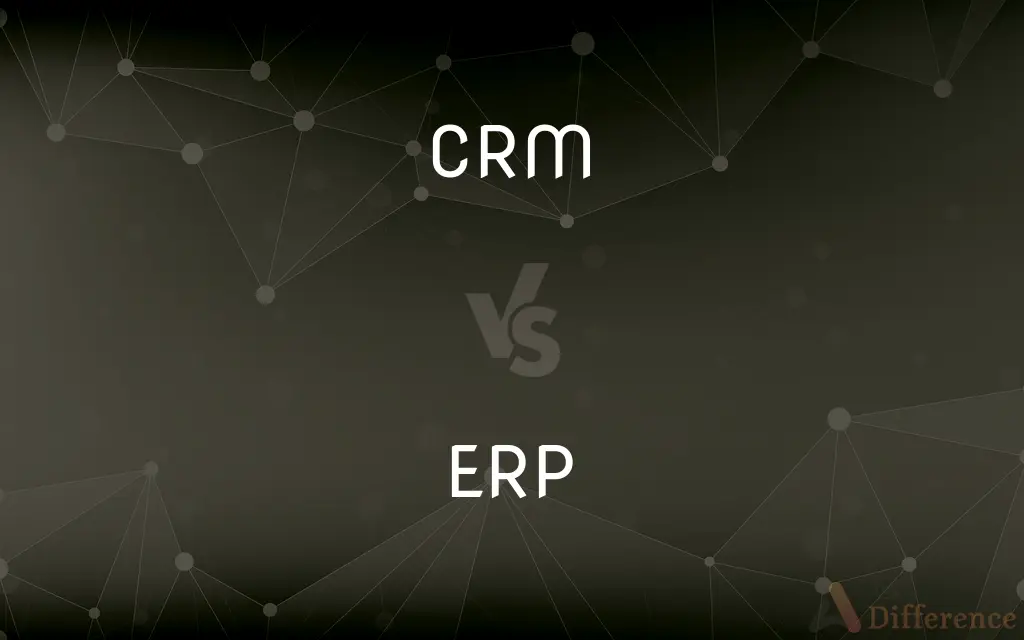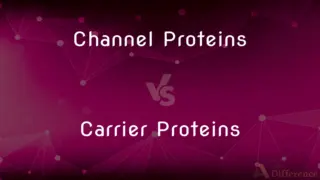CRM vs. ERP — What's the Difference?
By Tayyaba Rehman — Published on December 9, 2023
CRM focuses on managing customer relationships, while ERP integrates various business processes and operations. Both are business software solutions.

Difference Between CRM and ERP
Table of Contents
ADVERTISEMENT
Key Differences
CRM stands for Customer Relationship Management. It's a tool designed to manage and analyze customer interactions throughout the customer lifecycle. ERP, or Enterprise Resource Planning, encompasses a suite of applications that integrate various business processes, from procurement to human resources.
CRM primarily aims to enhance a company's relationship with its existing and potential customers. On the other hand, ERP streamlines back-end processes across departments, ensuring smoother operations and data flow throughout the organization.
CRM solutions may offer features such as contact management, sales tracking, and customer support. ERP systems are comprehensive, encompassing areas like finance, supply chain, and inventory management, aiming to unify business processes.
Both CRM and ERP are vital for businesses, serving different needs. While CRM enhances customer engagement and sales, ERP ensures operational efficiency and an integrated approach to business management.
Comparison Chart
Primary Focus
Managing and analyzing customer interactions.
Integrating various business processes and operations.
ADVERTISEMENT
Main Benefits
Enhances customer relationships and sales.
Streamlines back-end processes across departments.
Typical Features
Contact management, sales tracking, customer support.
Finance, supply chain, inventory, HR management.
User Base
Sales, marketing, and customer support teams.
Across various departments in an organization.
Implementation Goal
Improve customer satisfaction and loyalty.
Enhance operational efficiency and data consistency.
Compare with Definitions
CRM
CRM systems centralize customer data for better insights.
The CRM dashboard offers a holistic view of our client interactions.
ERP
ERP aims to enhance operational efficiency in businesses.
The introduction of the ERP reduced processing times significantly.
CRM
CRM is a tool for managing customer relationships.
The sales team uses the CRM to track leads and conversions.
ERP
ERP integrates various business processes across an organization.
The new ERP system unified our finance and supply chain data.
CRM
CRM solutions enhance customer engagement and boost sales.
Implementing a CRM increased our customer retention rate.
ERP
ERP applications encompass functions like finance, HR, and inventory.
The ERP module for HR has streamlined our recruitment process.
CRM
CRM aids in improving customer satisfaction and loyalty.
After adopting a CRM, we noticed an uptick in positive reviews.
ERP
ERP systems streamline back-end processes for smoother operations.
After deploying the ERP, inventory management became more efficient.
CRM
CRM helps in analyzing customer interactions throughout their lifecycle.
With the CRM, the marketing team can gauge campaign effectiveness.
ERP
ERP ensures consistent data flow across departments.
The finance team appreciates the ERP for its real-time data updates.
Common Curiosities
Can a business use both CRM and ERP simultaneously?
Yes, many businesses use both CRM and ERP to manage customer relations and internal processes effectively.
What's the main goal of ERP?
ERP's main goal is to integrate and streamline business processes across an organization.
What does CRM stand for?
CRM stands for Customer Relationship Management.
What's a common feature found in ERP but not in CRM?
Inventory management is a common feature in ERP systems but typically not in CRM.
How do ERP systems aid in decision-making?
ERP provides real-time data and integrated insights from various departments, aiding informed decision-making.
Can CRM integrate with ERP?
Yes, many CRM and ERP systems can be integrated for a unified view of customer data and business processes.
Which software focuses more on customer interactions?
CRM focuses more on managing and analyzing customer interactions.
How does CRM help in marketing?
CRM aids marketing by analyzing customer interactions, gauging campaign effectiveness, and segmenting customers.
Is CRM beneficial for sales teams?
Absolutely, CRM helps sales teams track leads, conversions, and customer interactions.
Can CRM improve customer loyalty?
Yes, by enhancing customer engagement and satisfaction, CRM can boost customer loyalty.
Why is data consistency important in ERP?
Data consistency in ERP ensures accurate reporting, decision-making, and streamlined operations across departments.
Which departments typically use ERP systems?
ERP systems are used across various departments, including finance, HR, and supply chain.
What's the benefit of having both CRM and ERP?
While CRM enhances customer relations and sales, ERP ensures operational efficiency, providing a holistic business management approach.
Is CRM software mainly for large businesses?
No, CRM software is beneficial for businesses of all sizes, from startups to large corporations.
Which system, CRM or ERP, is more comprehensive in business functions?
ERP is more comprehensive as it encompasses various business functions across the organization.
Share Your Discovery

Previous Comparison
Bud Light vs. Budweiser
Next Comparison
Channel Proteins vs. Carrier ProteinsAuthor Spotlight
Written by
Tayyaba RehmanTayyaba Rehman is a distinguished writer, currently serving as a primary contributor to askdifference.com. As a researcher in semantics and etymology, Tayyaba's passion for the complexity of languages and their distinctions has found a perfect home on the platform. Tayyaba delves into the intricacies of language, distinguishing between commonly confused words and phrases, thereby providing clarity for readers worldwide.














































